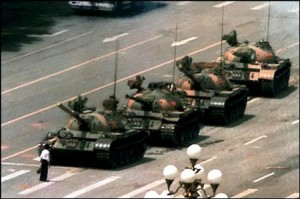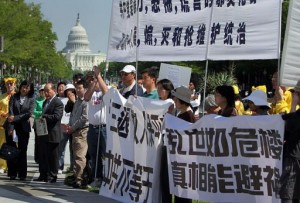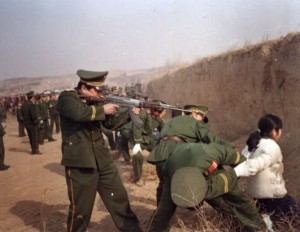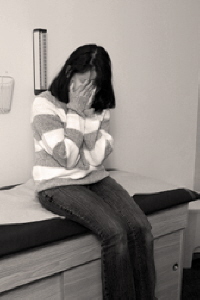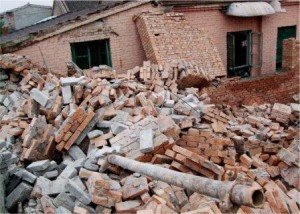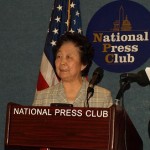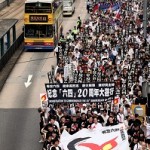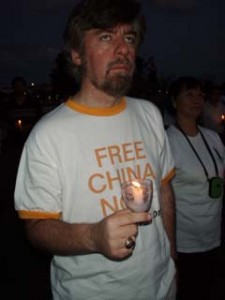My good friends in support of Chinese democracy, freedom, and dignity sent me this article below in Epoch Times about the Kennedy Center hosting of performances of the Chinese National Ballet organized by the Communist Chinese government. They protest the ballet’s history of glamorizing Communist violence and oppression. They have organized 25 human rights groups to join them in an Open Letter which will be published stating their protest on this.
We fully respect the rights of the Kennedy Center and all private businesses to chose what and who they will have at their establishments. We respect their freedom of expression, including that we disagree with. We support our universal freedoms and human rights for the Chinese people and all people around the world.
We reject the glorification of Communist violence, and we reject glorification of a message of oppression by the Chinese Communist Party (CCP). We reject the messages of violence and oppression which have been part of this ballet’s performances.
We support freedom, democracy for the Chinese people.
We reject the totalitarianism of the Chinese Communist Party (CCP).
We call for the end of the Laogai concentration camps.
We call for the end of the forced abortions and abuses against women and children.
We call for the end of the oppression of all minority groups, religious minorities, Falun Dafa, and all those oppressed by the CCP.
We will do so in the streets of Washington DC, we will do so in the streets of Hong Kong. We will do so everywhere around the world, someday in the streets of Beijing – when the Chinese people are free at last….
The pain of the Chinese people who seek democracy and freedom is a voice the world cannot ignore.
So we stand with our brothers and sisters in support of Chinese democracy, freedom, dignity, and justice – because we are all Responsible for Equality And Liberty.
=====================================
By Matthew Robertson
Epoch Times Staff
September 23, 2011
Chinese Ballet at Kennedy Center Extols Violent Revolution
Epoch Times
Chinese Ballet at Kennedy Center Extols Violent Revolution
WASHINGTON—Audiences at the prestigious Kennedy Center are being asked to applaud a ballet that celebrates a movement that went on to murder hundreds of thousands. The Chinese National Ballet is performing on Sept. 22-24 “The Red Detachment of Women,” which glorifies the history of the communist land reform campaign in China, while concealing the reality of the violence that suffused it. In 1931 Mao Zedong, head of the communist-controlled regions, signed off on a policy of land reform that would “Rely on the poor peasants and hired laborers, make allies of the middle-peasants, exploit the kulaks and exterminate the landlords.” What followed in the 1930s, 40s, and into the 50s, was mass violence directed at “class enemies”: torture, arson, live burials, smashing and theft—a reign of terror designed to impose the political will of the Chinese Communist Party (CCP) on villages across the country. Hundreds of thousands were killed. Acts I and II from “Red Detachment” performed at Kennedy precede a scene from “Swan Lake” and the Chinese nationalist favorite “Yellow River.”
“They used this play to trick the Chinese people, and now they’re tricking Americans,” says Wu Fan, editor of China Affairs and co-author of an open letter that opposes the performance.
“They’re bandits and arsonists attacking wealthy people, taking their property and splitting the profits, and they’re portrayed as heroes,” he said in a telephone conversation. “Americans would not stand for a ballet that made Hitler seem glorious. Why should they accept one that makes Mao heroic? Both are mass murderers.”
The “Red Detachment” is a flagship of the CCP’s revolutionary operas, infamous in China because eight of them were the only operas permitted in the country during the Cultural Revolution, from 1966-1976. It is most well-known for being performed for President Nixon when he visited China in 1972.
The open letter, sent to media, politicians, and the Kennedy Center, argues that the performances are part of the CCP’s comprehensive approach to Western nations, which conceals hostility and a desire for dominance, while engaging in spying, propaganda, and infiltration.
Organizations that signed the letter include Washington Forum, the United League for Democracy in Laos, and the Non-Violent Movement for Human Rights for Vietnam—all groups opposing communism in one way or another.
The thrust of the activists’ complaints is echoed by academics. As Xing Lu, a China scholar, writes in her book: “Hatred permeates every model opera.” The basic message of these operas, Xing Lu writes, is that those designated as villains must be eliminated through violent struggle so a new society can be established.
The plays are meant to foster a “deep hatred for all class enemies and love for the Communist Party,” Xing Lu writes. The “Red Detachment” is the epitome of the genre. It eulogizes communist ideology and showers hatred on class enemies.
The “Red Detachment” is adapted from historical events during the early 1930s, telling the story of how a victimized peasant girl joined a woman’s detachment in the CCP’s red army and overthrew the landlords on Hainan Island, off the south coast of China.
The sinologist Simon Leys explains what land reform, carried out in various regions from the 1930s until the early 1950s, entailed: “By the fall of 1951, 80 percent of all Chinese had had to take part in mass accusation meetings, or to watch organized lynchings and public executions,” he writes.
The crowd was expected to roar in unison when the accusations were read out. “These grim liturgies followed set patterns that were once more reminiscent of gangland practices,” he says, with the purpose being to “ensure collective participation in the murder of innocent victims.”
The airbrushed version of one such history, on which the “Red Detachment” ballet is based, went from novel to ballet to film and then into ballet as commissioned by Jiang Qing, Chairman Mao’s wife.
Jiang was czar of the arts and guardian of revolutionary ideology in China during the Cultural Revolution, and personally made sure the performances were sufficiently red. She added rouge to the cheeks of the female lead and ordered that red flannel be used for collar tabs. She also made a Party representative the protagonist of the play, ensuring it would “present correctly the relationship between the army and the people.”
The depictions of females engaging in violence (in the play they wield rifles and large knives, strike aggressive poses, and kill landlords without mercy, for example) were anathema to prevailing notions of femininity in China at the time.
Scholars have suggested that such imagery may have contributed in no small part to a culture that saw young female Red Guards run rampant during the Cultural Revolution, torturing and killing their school teachers, ransacking houses, and brutalizing other supposed “class enemies.”
Along with the ballet format, acting techniques are pulled from Beijing opera and Chinese folk dances, and the music is meant to be clear and simple so as to communicate the message effectively. The dumbed down messages also had the useful outcome of “enforcing the uniformity of thought characteristic of… totalitarian societies,” Xing Lu writes in her book.
As simple messages are repeatedly drilled into people’s minds through performances like “Red Detachment,” “the range of word choices became smaller and smaller, the Chinese worldview became narrower and narrower,” Xing Lu says. “Especially when singing became automatic, lyrics and music exercised a hypnotic power to take away the ability to think.”
According to a number of scholars who have written about the play, the story finishes with the protagonist vowing to follow Mao’s motto that “political power grows out of the barrel of a gun.”
The play will be performed in the theater named for former president Dwight D. Eisenhower. Perhaps it is best that this staunch anti-communist is not around to hear the refrain “Communist ideology is the truth, the Party leads the way” sung in the theater that bears his name.
The Kennedy Center could not be reached at press time.
